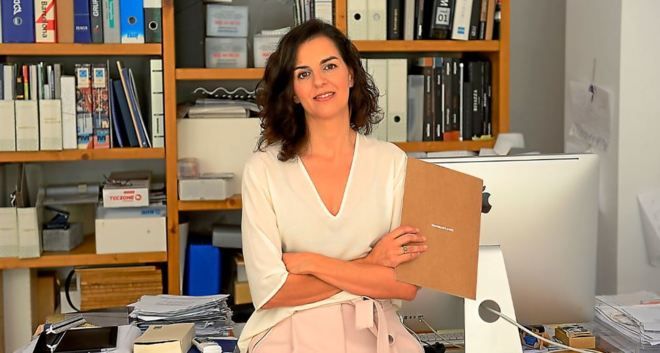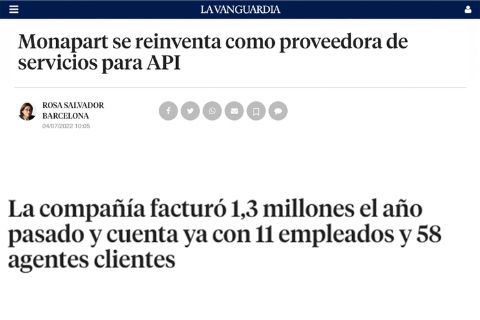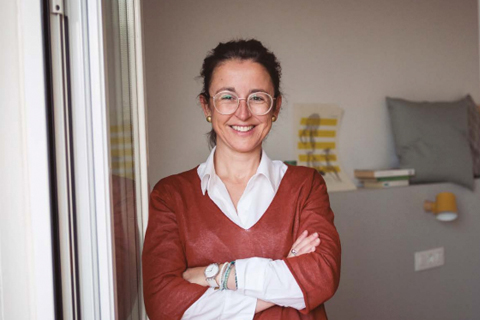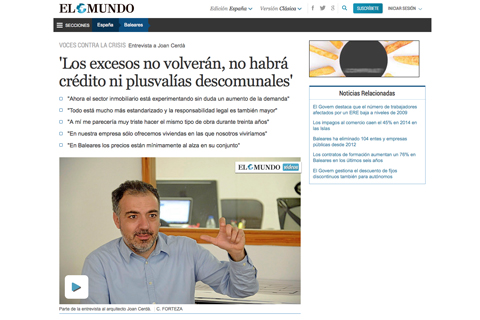Interview with Tete Crespí, partner in Monapart Palma, in El Mundo
Tete Crespí, partner at Monapart Palma, offers her critical and coherent vision of the real estate sector.
Sunday, 19 June dawned with a double-page interview with Tete Crespíour partner at Monapart Palma, by Nadal Suau for the newspaper El Mundo (Balearic edition). It was fair and necessary, as she was at a clear disadvantage compared to her partner (and husband) Joan Cerdà, whom the same newspaper interviewed in February 2015, "Voices against the crisis. Now they are at peace. ;D

Below we reproduce part of the interview, but we recommend that you read the whole of it, because his vision of the situation of the real estate sector in Mallorca is clear, coherent and critical. Essential reading.
[Question] Monapart claims to be a real estate agency that responds to a new culture for the sector. Why?
[Answer] First of all, because it was born six years ago, i.e. after the real estate crash. In fact, it was born from the ashes of the old world. What happened was that an architect, José Luis Echevarría, and a journalist, Eduard Solé, met at an ESADE course in Barcelona, and saw a hole in the market that they could fill if they applied new rules of the game. They were joined by lawyer and publisher Olga Sala.
[P] But then, neither of them was, strictly speaking, a real estate professional....
[A] Not entirely, but at the same time it was very coherent that they could turn to him: it is obvious that José Luis knew the logic of housing very well, and the others knew the logic of communication. And they both knew that the real estate sector needed more professionalisation and, above all, a lot of education: after all, people still perceive real estate agents as intermediaries who simply pass on contacts and collect a commission. Therefore, the best thing to do is to try to skip it in order to save money. However, if they do their job well, the agent provides full support throughout the whole process. And at the beginning of that process is the valuation of the product, one of the keys to any sale. People have a habit of doubling the price when they put a product on the market, with the idea that this will allow them to negotiate later. But I consider it fundamental to go out at market price, because if a neighbour sells a property of equivalent quality and features for a lower price, you are at a clear disadvantage. ... the truth is that the sector is dragging behind it bad habits that were acquired long before the crisis. And to leave them behind, we must insist on technical training, because valuing a product well involves handling a lot of documentation, establishing an accurate calculation of costs, having very precise information, knowing the market well, etc. At Monapart we appraise each property with a minimum and a maximum limit, and the truth is that the circumstances and urgencies of the seller or a minimal and unavoidable negotiation may intervene, but the price of our appraisals has almost never been lowered by more than 5 %. That's a great success... and the fact that our valuations are so accurate is also a matter of honesty. If you put a property on the market for eight hundred thousand euros and end up selling it for six hundred thousand, I won't say that you've tried to cheat, but you've certainly shown that you didn't believe in the initial price.
[P] This is all very well, but admit that the culture of negotiation is deeply rooted. On the other hand, is it really such a good idea to rely on one agency, and only one? Why?
[A] It's true, everyone seems to like negotiation. If you don't get a bargain, the buyer feels awkward, he suspects he hasn't been on the ball. As for the other thing: well, if you want to sell a property, you don't need an agency, you can do it on your own. But if you do decide to use an agency, it is worth trusting only one, because otherwise the potential buyer will start to find it on different portals, probably photographed and described in different ways, with varying prices, etc. This damages the product, devalues it.
[P] From Barcelona to Palma, what aspects change for a business like this?
[R] Well, there are some ideas that penetrate Barcelona before an environment like Mallorca. For example, there are a lot of foreigners with an average profile, not necessarily in search of very expensive products, and that changes the market a little. As for Mallorca, perhaps my biggest concern is that it is difficult to find the type of product that we would like to offer. And if we talk about rentals, there are hardly any, especially because the holiday market has distorted everything. We will see what happens in September with the new regulations and which properties can be offered as holiday rentals.
I think it's good that there are holiday rentals, it's logical and responds to the characteristics of the city. But if that means that the local inhabitant cannot rent, there is an objective problem and the city becomes organised only for the passing tourist.
[P] And in your view, what should happen?
[R] I think it's good that there are holidaymakers, it's logical and responds to the characteristics of the city. But if that means that the locals can't rent, there is an objective problem and the city becomes organised only for the passing tourist. This has to be regularised, otherwise the centre could become unlivable, like Barcelona. If you add to this the Swedish, German, etc. buyers, with great purchasing power, we locals are a little bit in check.
[P] Is there even a risk of ghettoisation?
[A] Well, you have to find a balance, because a Swede like Mikael Landström, whom you interviewed last week, would deserve the city's Gold Medal for recovering parts of this city that the people of Palma had neglected. And when someone from outside invests in a property in the old town and makes it spotless, it's hard to criticise that. But at the same time, it seems clear to me that the city is growing without a very clear model of what it wants to be; and the two speeds, local and foreign, because of the difference in purchasing power, is another evidence.
There are two main types of approach in this business: the real estate focused on a specific area, and of course those targeting foreign countries. We do not represent either of these profiles.
[P] So far, you have talked about a plus of professionalism in your work as a distinctive mark of Monapart, but looking for information as you do, you talk about "hipster real estate" or "post-real estate". What does that mean?
[R] This is in response to the search for new concepts that address the public we are aiming for, young people who are, so to speak, like us: the local middle class, who are looking for a house that is perhaps not luxurious but beautiful, that is to say with charm, history and rooted in its surroundings. Please note that there are two types of approach in this business: the real estate focused on a specific area, and of course those targeting foreigners. We do not represent either of those profiles. And then, what we are very concerned about is the relationship with our clients, because some of them are toxic and seem to be trying to compete with you by selling on their own, which makes absolutely no sense at all. You need mutual trust for this to work. We try to earn that trust by working and marketing the product with the utmost rigour: we give a lot of information, in the most attractive and honest way possible, and filtering the profile of those who visit each property. We do not aspire to have a thousand people waiting to visit a flat, nor do we carry out massive advertising campaigns, nor do we stand in Jaime III with a place full of agents. Our work is more in-house, with one foot in design and the other in architecture, in any case always very technical.





